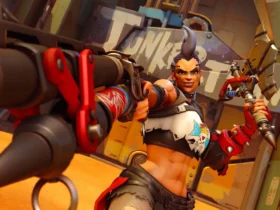Wargame Ad Infinitum is not your usual game. It doesn’t have an arcade-like feel as certain Call of Duty games do, nor does it strive for hyperrealism like Hell Let Loose.
Although even if isn’t a completely original concept in war games, Ad Infinitum aims to stay focused on the cycle of conflict and the tragedies that result from that cycle.
Ad Infinitum’s way to getting there, though, is what makes it special. It draws influence from horror stories across a variety of media and uses a wonderfully spooky assortment of sounds that are supposed to sound just familiar enough to make you uneasy.
During an interview for ComicBook.com, Lukas Deuschel, co-owner of Hekate opened up about the game’s sound and horrors and also had some suggestions as to why gamers would want to play it more than once.
Ad Infinitum is the title of the game, but it’s also a Latin expression that means “to infinity” and is used to describe a continuous cycle.
During a new interview, Deuschel revealed how that phrase related to the game, saying that “You are stuck in the cycle of war. And it’s up to the player if you want to break out of the cycle or be stuck in the game because we have different endings in the game based on some decision points.”
Ad Infinitum’s World War I scenario, which most games skip in favor of World War II or more recent battles, not only emphasizes the soldier and his comrades but also evokes a family story.
Each family member is impacted by the war, just as it is with the German soldier you control in the game.
That only touches the surface of Ad Infinitum, but after seeing the trailers you’ll realize how crucially important psychological terror is to the storyline.
Some of the things you’ll encounter in Ad Infinitum include repulsive monsters and equally unsettling set pieces, and Hekate found plenty of inspiration for these and other horrors.
According to Deuschel, the Hekate developers are “addicted” to all forms of horror in media, with a specific fondness for producers like Frictional Games, the company behind the Amnesia video games.
Psychiatrist Carl Jung’s investigations into the occult and subconscious also served as a major source of inspiration.
“We read a lot of books, Nothing New on the Western Front, Storm of Steel, but also movies like Jacob’s Ladder were huge inspirations. Come and See. Game-wise, of course Layers of Fear,” he mentioned.
Given how popular Call of Duty is, it’s difficult to avoid parallels to Activision’s titanic war game.
It appears as though Deuschel and the other members of Hekate are hoping that players initially perceive it through the perspective of a blockbuster war game with big explosions, moments of treachery, and intricate plots in order to serve up a misleading first impression.
“That’s what a lot of games do. They kind of use the war topic to entertain players and really have these patriotic vibes to it. And we play a bit with it, but then we break expectations. We do this throughout the game, breaking expectations of the player. So, you’re faced with, ‘Okay, war is really cruel,’ and not only for soldiers, but we also show how families suffer from this. How wives suffer from losing their children.”
Deuschel subsequently clarified that Hekate used a few red herrings in the game to have players question crucial events and findings.
You’d struggle to find a scene like that in another war game, but there is one in this one where a woman is attempting to communicate with her deceased sons.
Deuschel said that “We kind of lay out these different kinds of red herrings. It’s also a bit up to the player to interpret what’s real and what’s not real.”
You’re going to hear a lot of disturbing sounds when navigating around monsters and the battlegrounds in which the game is set while you’re not attempting to sort out what’s real and what’s not.
Since Deuschel is also the head sound designer of Hekate, you may thank him for those as well.
About 80 percent of the noises in the game, in his estimation, were captured by hand or, in some cases, by foot.
In order to mimic weapon noises while adhering to German gun laws, Deuschel and his colleagues used wooden soled shoes to capture multiple impacts on various surfaces in an abandoned factory.
They also used pickaxes to break pallets.
These are dedicated techniques, but the most fascinating parts come from the noises the creatures make.
“But I think the trickiest ones, to be honest, are not the authentic wrap-around sounds but the creature sounds. Those are really complicated. You have to really figure out how to approach it and try different things. For one creature, we use baby recordings of my daughter, and modified them in a really crazy way. You might have noticed in the house this weird whining of the creature when you walk upstairs. That was basically the source material,” he shared.
As mentioned before, Ad Infinitum does provide numerous endings and ways to get them so it can take you more than one playthrough to hear all these sounds and more.
But is it really feasible to have a somewhat satisfying conclusion in a game this dark?
“I don’t want to spoil too much, but you can kind of have a good ending. And I think, to be honest, this one might be even the most effective one. But you also have a really, really bad ending, because imagine your actions have consequences, and maybe it also surrounds your own family. But I don’t want to drop too much,” Deuschel explained.















Leave a Reply